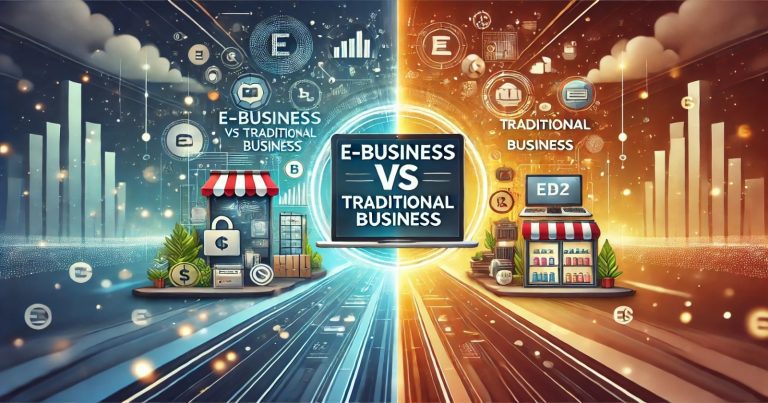E-business leverages digital platforms, offering global reach and 24/7 accessibility, while traditional business relies on physical locations and personal interactions. With the rise of technology, e-business has revolutionized commerce by reducing costs and automating operations. However, traditional businesses thrive on customer trust, tangible experiences, and localized expertise. Both models have unique advantages and challenges, making them suitable for different industries and goals. Understanding E Business vs traditional business iis essential for choosing the right approach. This article explores the key features, benefits, and comparisons of these models to help you decide.
Meaning of E Business
E Business, also known as electronic business, refers to the processes of conducting business operations through digital channels. It merges technology into all activities, including selling, interacting with customers, managing the supply chain, and data analysis.
Characteristics of E Business:
- Global Reach: Digital platforms help businesses reach worldwide.
- 24/7 Availability: E-business operates at all times of the day and night, which increases accessibility.
- Cost Efficiency: Lower operational costs because of lesser physical infrastructure.
- Automation: Automates operations such as payment processing, inventory management, and customer service.
Meaning of Traditional Business
A traditional business is a physical business where the transaction takes place in person. It is more dependent on in-person contact, tangible products, and localized markets.
Characteristics of Traditional Business
- Physical Location: Requires a storefront or office space to conduct operations.
- Face-to-Face Contact: Trust is established through personal relationships.
- Localized Market: It is an area-specific market.
- Fixed Operating Hours: Limited to a set schedule of operation.
E Business vs Traditional Business
E Business vs Traditional Business represent two contrasting approaches to commerce. Below is a detailed comparison of these models, analyzing ten essential parameters to help you understand their unique characteristics and benefits.
| Basis | E Business | Traditional Business |
| Reach | Global, leveraging the internet. | Limited to local or regional areas. |
| Cost of Operation | Lower, due to minimal physical infrastructure. | Higher, requiring physical stores and staff. |
| Accessibility | Accessible 24/7 via online platforms. | Restricted to business hours. |
| Customer Interaction | Mainly virtual through digital tools. | Primarily face-to-face. |
| Initial Investment | Relatively low for online platforms. | High due to real estate and physical setups. |
| Flexibility | Highly flexible, allowing remote operations. | Limited by location and fixed hours. |
| Scalability | Easier to scale globally. | Limited scalability beyond geographic limits. |
| Payment Methods | Multiple online options available. | Typically cash and card, in-person. |
| Data Usage | Extensive use of analytics for decisions. | Limited use of structured data. |
| Personalization | Offers tailored experiences through AI tools. | Relies on personal interactions for tailoring. |
Advantages of the Traditional Business
Traditional business retains some advantages that come with it, despite the emerging digital environment:
- Trust through Personal Contact: Relatively builds firm relationships with customers.
- Tangibility of Products: Allows customers to examine products before purchase.
- Localized Knowledge: Possesses detailed knowledge about local customer requirements.
- Immediate Service: Addresses customers’ inquiries promptly in the store.
- Anchor Shop: Provides a central spot within local communities.
Advantages of E Business
E Business comes with several benefits that make its popularity soar within the modern business arena:
- Cost Efficiency: This eliminates the setup of physical.
- Wider Access: Customers in any part of the world can reach it.
- Convenience to Operate: It allows remote work-from-anywhere setups
- Data Driven: Can analyze trends, predict customer behavior
- Scalability: Expands new markets without investment
E Business vs Traditional Business FAQs
What is the main difference between E Business and Traditional Business?
E Business does not have a physical presence, but traditional businesses require physical space to interact and carry out transactions.
Can traditional businesses adopt e-business models?
Yes, they can use hybrid models by incorporating the practices of e-business such as online sales and digital marketing to increase reach.
Is E Business applicable to all industries?
While it suits many industries, some sectors like hospitality and real estate benefit from a combined approach of e-business and physical operations.
How does E Business impact customer experience?
E-business enhances convenience with 24/7 access, personalized services, and faster response times compared to traditional setups.
Which is more cost-effective: E Business or Traditional Business?**
E Business tends to be relatively cheaper because the overhead costs and resource utilization efficiency are lower.


